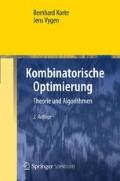Zusammenfassung
In diesem Kapitel besprechen wir, wie man vorgeht, wenn zusätzlich die Kanten mit Kosten belegt sind. Zum Beispiel könnte man in der Anwendung des MAXIMUM-FLOW-PROBLEMS auf das JOB-ZUORDNUNGSPROBLEM (siehe Einführung in Kapitel 8) Kosten auf den Kanten einführen, um den Arbeitern verschiedene Gehälter zuzuordnen; das Ziel wäre dann, bis zu einem festgelegten Zeitpunkt und zu minimalen Gesamtkosten alle Jobs erledigt zu haben. Natürlich gibt es etliche weitere Anwendungen.
Access this chapter
Tax calculation will be finalised at checkout
Purchases are for personal use only
References
Arkin, E.M., Silverberg, E.B.: Scheduling jobs with fixed start and end times. Discrete Applied Mathematics 18, 1–8 (1987)
Armstrong, R.D., Jin, Z.: A new strongly polynomial dual network simplex algorithm. Mathematical Programming 78, 131–148 (1997)
Busacker, R.G., Gowen, P.J.: A procedure for determining a family of minimum-cost network flow patterns. ORO Technical Paper 15. Operational Research Office, Johns Hopkins University, Baltimore (1961)
Cunningham, W.H.: A network simplex method. Mathematical Programming 11, 105–116 (1976)
Dantzig, G.B.: Application of the simplex method to a transportation problem. In: T.C. Koopmans (Hrsg.) Activity Analysis and Production and Allocation, S. 359–373. Wiley, New York (1951)
Edmonds, J., Karp, R.M.: Theoretical improvements in algorithmic efficiency for network flow problems. Journal of the ACM 19, 248–264 (1972)
Fleischer, L., Skutella, M.: Quickest flows over time. SIAM Journal on Computing 36, 1600–1630 (2007)
Ford, L.R., Fulkerson, D.R.: Constructing maximal dynamic flows from static flows. Operations Research 6, 419–433 (1958)
Ford, L.R., Fulkerson, D.R.: Flows in Networks. Princeton University Press, Princeton (1962)
Gale, D.: A theorem on flows in networks. Pacific Journal of Mathematics 7, 1073–1082 (1957)
Goldberg, A.V., Tarjan, R.E.: Finding minimum-cost circulations by cancelling negative cycles. Journal of the ACM 36, 873–886 (1989)
Goldberg, A.V., Tarjan, R.E.: Finding minimum-cost circulations by successive approximation. Mathematics of Operations Research 15, 430–466 (1990)
Grötschel, M., Lovász, L.: Combinatorial optimization. In: Graham, R.L., Grötschel, M., Lovász, L. (Hrsg.) Handbook of Combinatorics, Vol. 2. Elsevier, Amsterdam (1995)
Hassin, R.: The minimum cost flow problem: a unifying approach to dual algorithms and a new tree-search algorithm. Mathematical Programming 25, 228–239 (1983)
Hitchcock, F.L.: The distribution of a product from several sources to numerous localities. Journal of Mathematical Physics 20, 224–230 (1941)
Hoffman, A.J.: Some recent applications of the theory of linear inequalities to extremal combinatorial analysis. In: Bellman, R.E., Hall, M. (Hrsg.) Combinatorial Analysis, S. 113–128. AMS, Providence (1960)
Hoppe, B., Tardos, É.: The quickest transshipment problem. Mathematics of Operations Research 25, 36–62 (2000)
Iri, M.: A new method for solving transportation-network problems. Journal of the Operations Research Society of Japan 3, 27–87 (1960)
Jewell, W.S.: Optimal flow through networks. Interim Technical Report 8, MIT (1958)
Karzanov, A.V., McCormick, S.T.: Polynomial methods for separable convex optimization in unimodular linear spaces with applications. SIAM Journal on Computing 26, 1245–1275 (1997)
Klein, M.: A primal method for minimum cost flows, with applications to the assignment and transportation problems. Management Science 14, 205–220 (1967)
Klinz, B., Woeginger, G.J.: Minimum cost dynamic flows: the series-parallel case. Networks 43, 153–162 (2004)
Orden, A.: The transshipment problem. Management Science 2, 276–285 (1956)
Ore, O.: Studies on directed graphs I. Annals of Mathematics 63, 383–406 (1956)
Orlin, J.B.: A faster strongly polynomial minimum cost flow algorithm. Operations Research 41, 338–350 (1993)
Orlin, J.B.: A polynomial time primal network simplex algorithm for minimum cost flows. Mathematical Programming 78, 109–129 (1997)
Orlin, J.B., Plotkin, S.A., Tardos, É.: Polynomial dual network simplex algorithms. Mathematical Programming 60, 255–276 (1993)
Plotkin, S.A., Tardos, É.: Improved dual network simplex. Proceedings of the 1st Annual ACM-SIAM Symposium on Discrete Algorithms, S. 367–376 (1990)
Schulz, A.S., Weismantel, R., Ziegler, G.M.: 0/1-Integer Programming: optimization and augmentation are equivalent. In: Spirakis, P. (Hrsg.) Algorithms – ESA '95. LNCS, Bd. 979, S. 473–483. Springer, Berlin (1995)
Schulz, A.S., Weismantel, R.: The complexity of generic primal algorithms for solving general integer problems. Mathematics of Operations Research 27, 681–692 (2002)
Tardos, É.: A strongly polynomial minimum cost circulation algorithm. Combinatorica 5, 247–255 (1985)
Tolstoĭ, A.N.: Metody nakhozhdeniya naimen'shego summovogo kilometrazha pri planirovanii perevozok v prostanstve. In: Planirovanie Perevozok, Sbornik pervyĭ, Transpechat' NKPS, Moskow (1930), S. 23–55. (See Schrijver, A., On the history of the transportation and maximum flow problems, Mathematical Programming 91, 437–445 (2002))
Tomizawa, N.: On some techniques useful for solution of transportation network problems. Networks 1, 173–194 (1971)
Vygen, J.: On dual minimum cost flow algorithms. Mathematical Methods of Operations Research 56, 101–126 (2002)
Wagner, H.M.: On a class of capacitated transportation problems. Management Science 5, 304–318 (1959)
Weiterführende Literatur
Ahuja, R.K., Magnanti, T.L., Orlin, J.B.: Network Flows. Prentice-Hall, Englewood Cliffs (1993)
Cook, W.J., Cunningham, W.H., Pulleyblank, W.R., Schrijver, A.: Combinatorial Optimization, Kap. 4. Wiley, New York (1998)
Goldberg, A.V., Tardos, É., Tarjan, R.E.: Network flow algorithms. In: Korte, B., Lovász, L., Prömel, H.J., Schrijver, A. (Hrsg.) Paths, Flows, and VLSI-Layout, S. 101–164. Springer, Berlin (1990)
Gondran, M., Minoux, M.: Graphs and Algorithms, Kap. 5. Wiley, Chichester (1984)
Jungnickel, D.: Graphs, Networks and Algorithms, 3. Aufl, Kap. 10, 11. Springer, Berlin (2007)
Lawler, E.L.: Combinatorial Optimization: Networks and Matroids, Kap. 4. Holt, Rinehart and Winston, New York (1976)
Ruhe, G.: Algorithmic Aspects of Flows in Networks. Kluwer Academic Publishers, Dordrecht (1991)
Skutella, M.: An introduction to network flows over time. In: Cook, W.J., Lovász, L., Vygen, J. (Hrsg.) Research Trends in Combinatorial Optimization, S. 451–482. Springer, Berlin (2009)
Author information
Authors and Affiliations
Corresponding authors
Rights and permissions
Copyright information
© 2012 Springer-Verlag Berlin Heidelberg
About this chapter
Cite this chapter
Korte, B., Vygen, J. (2012). Flüsse mit minimalen Kosten. In: Kombinatorische Optimierung. Springer-Lehrbuch Masterclass. Springer, Berlin, Heidelberg. https://doi.org/10.1007/978-3-642-25401-7_9
Download citation
DOI: https://doi.org/10.1007/978-3-642-25401-7_9
Published:
Publisher Name: Springer, Berlin, Heidelberg
Print ISBN: 978-3-642-25400-0
Online ISBN: 978-3-642-25401-7
eBook Packages: Life Science and Basic Disciplines (German Language)

